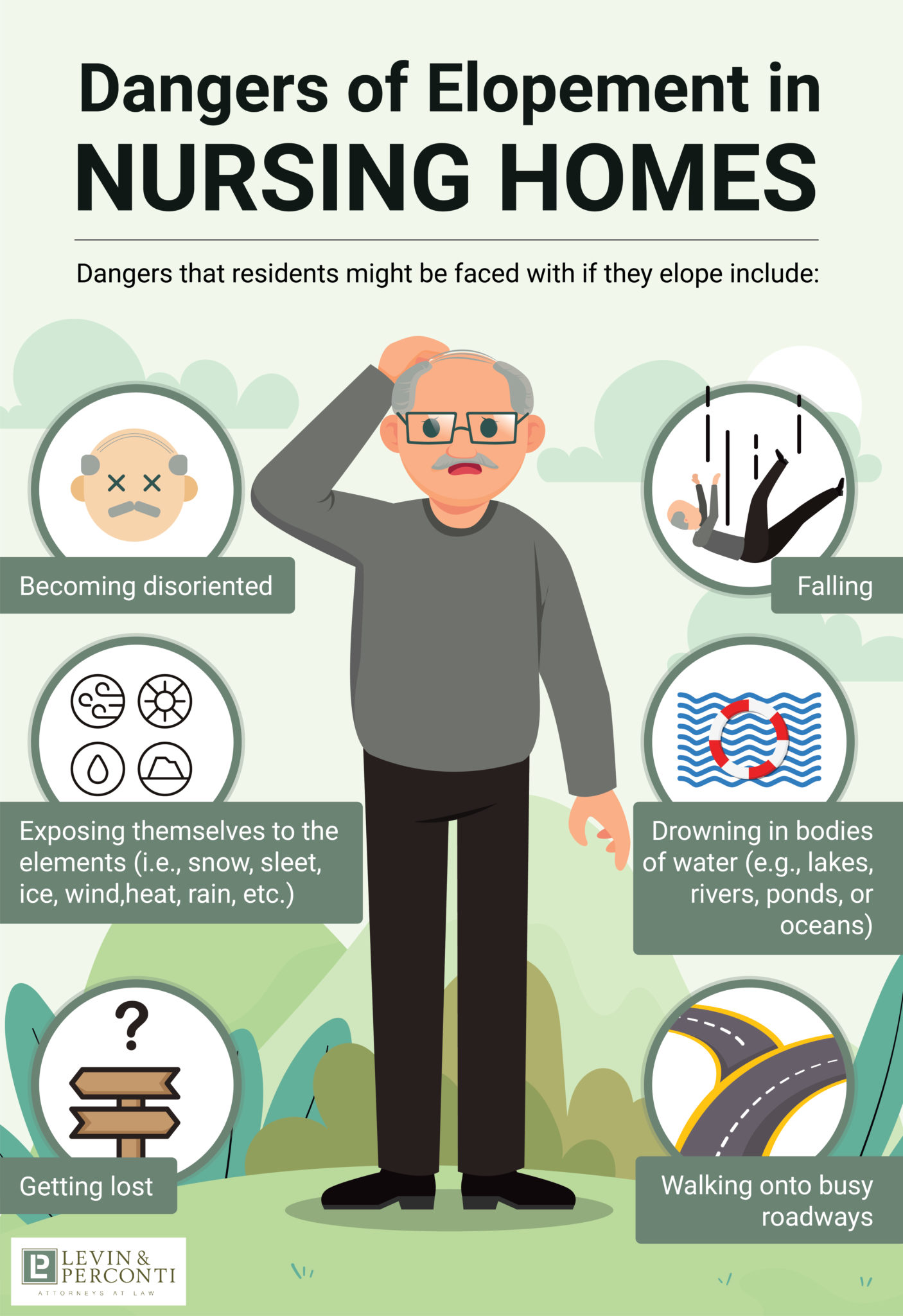Table of Content
According to the Alzheimer’s Association, approximately 60% of dementia patients wander from their assisted living facility at least once. Nursing homes are more than just a place for seniors to receive round-the-clock medical care. They should also be a place of bustling social activity for the residents there.

Walking in a safe, secure, and supervised environment can be a proactive outlet for this energy and can help prevent some of the wandering that could lead to elopement. Many residents may be prone to walking excessively or wandering to other areas of the facility, away from their room, or to a different floor. But, if wandering is unsupervised and the facility does not have the right security protocols and measures in place, it can lead to elopement. There is no excuse as to why a resident should ever wander into a non-resident area of a nursing home, or simply walk out of a nursing home facility unnoticed. Families who have had such an incident happen to one of their loved ones want – and deserve – answers.
Disguise Exits
It is highly encouraged that nurses monitor behaviors and become familiar with individual habits. Having a nurses’ station between residents’ rooms and exits decreases the chance a resident will wander outside unnoticed. Fewer than half of nursing home residents are up to date with their Covid vaccinations, according to official figures that could signal another deadly wave. With elopement and escape, it is highly likely that a nursing home will be found to have been negligent if one of the “at-risk” residents simply walks out the door. The best way to prevent a resident from the dangers of wandering or leaving unsupervised is a complete assessment upon admission. Visiting also allows you to see if your loved one is getting the proper care and treatment they need.

By placing a GPS tracker on their wristbands or shoes, you can monitor and keep track of where they’re going and prevent them from wandering off. One simple way to deter elopement in long-term care facilities is to make exits less obvious to residents. Some facilities have had success painting murals on exit doors or creating never- ending walking paths within the building. If residents wander unsupervised, it will be more difficult for them to actually exit the building. Nearly a third of nursing home residents and up to 70 percent of community-dwelling older adults suffering from cognitive decline wander from their supervised homes at least once during their stay. Wandering describes older adults with dementia who appear to be moving aimlessly, but are often doing so purposefully.
What is Wandering and Elopement?
There should also be comfortable wearables that can identify, track, and locate residents who are prone to wander. Over the course of the pandemic, 1 in 5 COVID-19 deaths was among those who were in a long-term care facility. As nursing home leaders redouble efforts to get staff and residents boosted with the new vaccine version, now recommended for those 6 months and older, they face complacency, misinformation and COVID-19 fatigue. They are calling on the White House for help with an “all hands on deck” approach.

Expressing frustration, asking for an exit, and physically attempting to leave the premises are all signs of such. If a resident displays dissatisfaction with the length of their stay, they are at a high risk of elopement. Seniors who regard themselves as caregivers are also at risk since they will seek to return to their previous obligations at home. Residents usually wander for a reason, whether it’s unhappiness at being in the facility or believing they must care for a pet. Permitting and encouraging supervised walks around the facility and in safe areas outside are ultimately beneficial to a resident’s physical health and mental well-being. A resident may be prone to wandering because nothing in their room is holding their interest.
What Are the Consequences of Wandering?
Facilities know that they have confused and cognitively impaired residents who cannot appreciate danger and need to plan accordingly. Elopement is the unsupervised wandering of a nursing home resident, often off the grounds of the facility. When residents do wander off the grounds, this can be a sign of negligence on the part of the nursing home staff. If a staff member failed to supervise residents properly and categorize them by their likelihood of eloping, a resident is more likely to elope.

Unfortunately, elopement and wandering risk assessments are not usually among them. These assessments are usually only prepared once a senior has already wandered. Compensation for injuries may include money for the pain and suffering that the injured person endured, as well as payment of all past and future medical bills that are related to injuries from the incident.
Patients who have elevated levels of stress, sleep disorders, anxiety, and aggressive tendencies may also have wandering episodes. Nursing homes who care for residents suffering from Alzheimer’s and others who are at risk of elopement are subject to many regulatory and insurance mandated protocols and equipment requirements. It is critical to make sure that all security systems are compliant with NFPA, FCC, NEC, CA, ETL and JCAHO requirements.

These particular residents often have no perception of the dangers that could possibly await them if they leave the nursing home facility. Nursing home wandering and elopement puts patients at risk of serious injury or death. Nursing homes are obligated to perform risk assessments and to identify which patients are at risk as well as put steps into place to prevent patients from eloping.
During the survey, officials observe everything, including the nursing home’s systems, processes, staff, finances, and more. State Surveys According to the Centers for Medicare & Medicaid Services, nursing homes that participate in Medicare ... Our nursing home neglect attorneys are experienced in handling these emotionally challenging cases. We treat our clients with compassion and guide them through every step of the legal process.

'New paradigm' moment as mRNA cancer vaccine developed by Covid shot maker Moderna slashes risk of tumor... We will automatically post your comment and a link to the news story to your Facebook timeline at the same time it is posted on MailOnline. To do this we will link your MailOnline account with your Facebook account. Dr Long said his staff are promoting the booster 'every chance we get', but they do not give it to people hospitalized with Covid-19, who are generally told to wait three months after being infected to get it. Cissy Sanders of Austin, Texas, whose 73-year-old mother is in a nursing home, was told by staff that they could not find a vaccinator.
For example, a person with dementia may believe that they must leave to go feed their dog at home or leave to take care of a family member. Any memory from a patient’s past may trigger the feeling that they need to leave the nursing home immediately to tend to something important and urgent. This begins by identifying those most likely to wander when they’re first admitted. Families can be of significant help by sharing a loved one’s history of wandering. However, people who never wandered in the past may be more likely to do so in a new and unfamiliar environment.

No comments:
Post a Comment